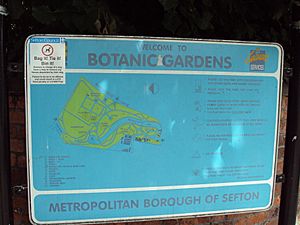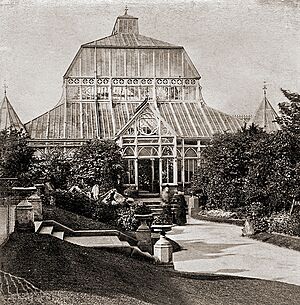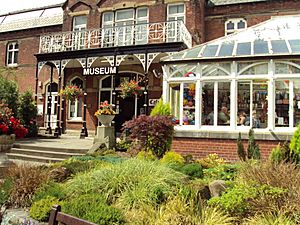Southport Botanic Gardens facts for kids
Quick facts for kids Southport Botanic Gardens |
|
|---|---|

Botanic Gardens welcome map on the Verulam Road entrance
|
|
| Lua error in Module:Location_map at line 420: attempt to index field 'wikibase' (a nil value). | |
| Type | Public park |
| Location | Churchtown, Southport, England |
| Created | 1874 |
| Operated by | Sefton Council |
| Status | Open all year round |
Southport Botanic Gardens is a beautiful park in Churchtown, a village near Southport, England. It's famous for its amazing flower displays and is sometimes called "The Jewel in the Crown." You might have even seen it on the TV show Gardener's World! It's a special place where you can explore many different plants.
Contents
The Story of the Gardens
The Botanic Gardens were started by a group of local people in 1874. They formed a company and bought land from the Hesketh Estate. They raised £18,000 to build a museum, a large greenhouse, and tea rooms. They also designed the beautiful gardens we see today.
The Lake's History
The park's lake was once part of a stream called Otter Pool. This stream flowed from Blowick all the way to the Ribble Estuary. People say that monks used to fish for eels in this stream long ago. The stream's flow into the gardens was blocked for many years. However, in 2012, the water channel was reopened. This helped clean out the stream bed.
Opening and Early Days
The gardens officially opened in 1875. A special ceremony took place, and a foundation stone was laid for the museum. The museum itself opened a year later in 1876.
In 1932, the gardens almost closed down because there were plans to build houses there. Luckily, the Southport Corporation saved them from being sold. The park reopened on August 28, 1937, with a new name: "The Botanic Gardens and King George Playing Fields." Today, it's simply known as Botanic Gardens again.
The Conservatory and Fernery
The gardens used to have a huge glass conservatory. It was very popular because it held many tropical plants from all over the world. This amazing greenhouse was eventually taken down. However, the fernery, which is a special garden for ferns, is still there. You can still see where the conservatory once stood, as its outline is now a lovely flower garden.
Botanic Gardens Museum
The Botanic Gardens Museum first opened in 1876. It was designed by local architects Mellor & Sutton. The famous showman Phineas T. Barnum even gave advice on how to build it! His top hat was once on display inside.
Museum Collections
The museum was the only local history museum in Sefton. It relied on donations from the public and support from Sefton Council. When the gardens closed in 1932, all the museum's collections were sold. Later, a man named John Scoles reopened the museum and started a brand new collection from scratch.
The museum gathered many interesting items, often donated by local people. These included the Cecily Bate Collection of Dolls, a Victorian room, and other items about Southport's past. One of the oldest and most special items was an ancient canoe found in Martin Mere.
Friends of the Museum
In the 1980s, a group called the "Friends of the Botanic Gardens Museum" was formed. They helped stop the museum from closing at that time. The Friends even had their own shop inside the museum building.
Museum Closure
Sadly, the Botanic Gardens Museum closed on April 24, 2011. This was part of a plan by Sefton Council to save money. The museum's collections were moved to the Atkinson Museum. Many items, like the Martin Mere canoe, are now on display there.
A collection of stuffed animals, known as the Pennington taxidermy collection, was moved to a different trust. This caused some debate because National Museums Liverpool wanted to keep part of it in Merseyside. However, the collection has since been returned to Sefton Council and is now also at the Atkinson Museum in Southport.
Saving the Gardens in 2012
When the museum closed, many gardening activities at the park were also cut back. Sefton Council considered closing even more parts of the park, like the Fernery, Aviary, Garden Nursery, and toilets.
A group of local people decided to act. They formed a community association to save the remaining parts of the Botanic Gardens. The park had already lost its museum, boats on the lake, a boat house, and a road train. Many park gardeners had also lost their jobs.
Today, volunteers from the Botanic Gardens Community Association work hard every Monday and Friday. They maintain the flower beds and enter them into the Britain In Bloom competition each year. They have big dreams to bring the gardens back to their former glory!
See also
 In Spanish: Jardín Botánico de Southport para niños
In Spanish: Jardín Botánico de Southport para niños
- Listed buildings in Churchtown, Merseyside
 | Emma Amos |
 | Edward Mitchell Bannister |
 | Larry D. Alexander |
 | Ernie Barnes |



